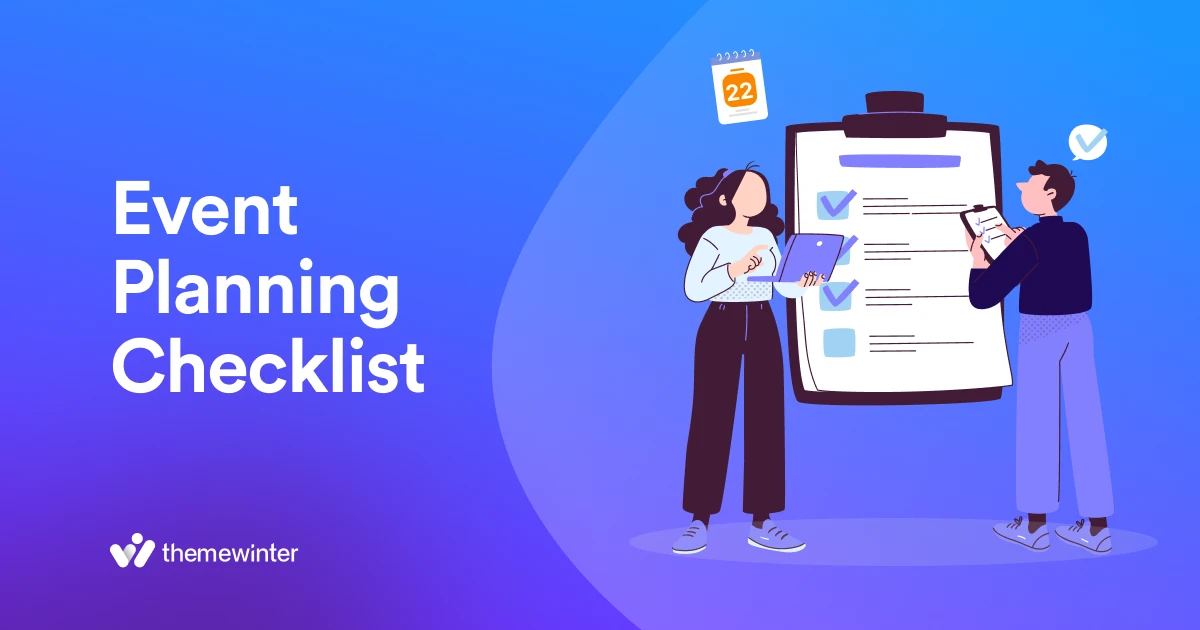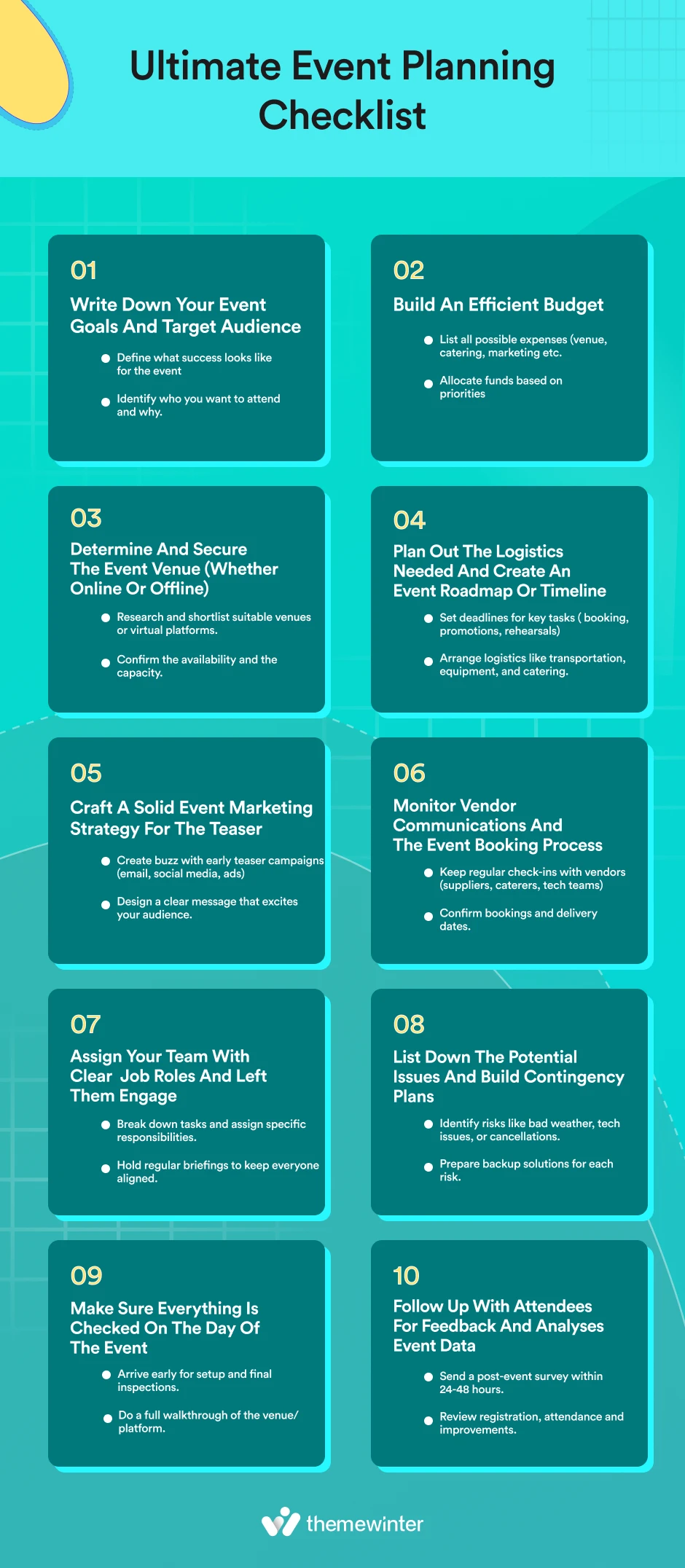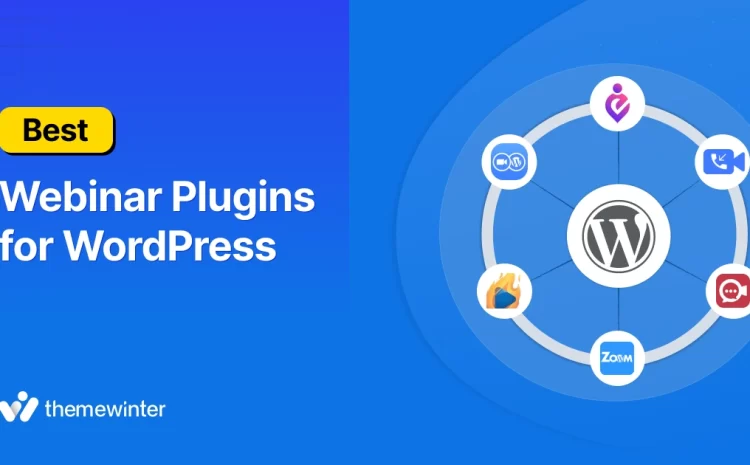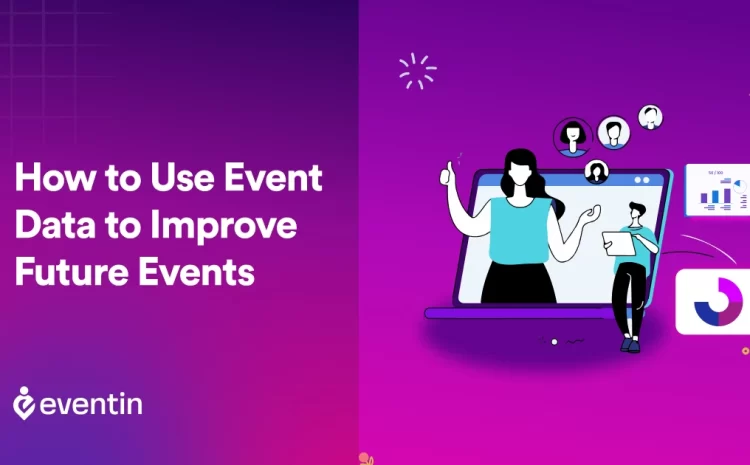Never Miss a Beat: Your Ultimate 10‑Step Event Planning Checklist (Pre‑, On‑, Post‑Event)

Table of Contents
Ever felt like you’ve planned everything—only to realize you missed something important?
You won’t miss if you have a proper planned event checklist upfront.
Yes, event planning can get overwhelming fast. From choosing a venue to managing attendees, there are dozens of moving parts—and missing just one can derail the experience.
That’s why we created this step-by-step event planning checklist to keep you organized from start to finish. So you don’t miss anything important and make your event successfull no matter what type of event you organize.
Check out this guide and learn what to do before, during, and after your event.
Ready to plan with confidence? Let’s jump in.
What does an event planning checklist include?
Think of your event planning checklist as a roadmap—a step-by-step guide that ensures no detail is missed. From defining goals to post-event analysis, it covers all the crucial elements needed to deliver a successful event.
Below are the key items you should include in your event checklist:
- Event goals and objectives
Start by setting a clear purpose. Are you aiming for brand awareness, lead generation, or sales conversions?
Planning an event without clear objectives is like sailing without a compass. Define your success metrics early—registrations, ticket sales, attendee engagement—and align every task accordingly.
- Target audience
Who is this event really for?
Clarify your audience demographics, preferences, and behaviors. Understanding your attendees helps you design an experience that resonates—from content to format and communication. This is especially crucial if you’re planning a hybrid event or targeting specific user personas.
- Budget planning
Budgeting is one of the most critical pieces of any event planning process.
Be sure to calculate both fixed and variable costs—venue, catering, rentals, marketing, logistics, and staff. Use our event budget planning guide to estimate smartly and keep your event profitable.
- Event venue
Location matters. Consider capacity, accessibility, technical capabilities, and the overall vibe.
Also, determine whether your event will be in-person, virtual, or hybrid. That single decision will impact your entire planning—from budget allocation to promotion and platform selection. Learn how to choose the right event platform based on your event type.
- Logistics and event scheduling
Once your venue is set, map out the operational details.
This includes vendor coordination, food management, transportation, security, and the event timeline. Don’t forget to plan how attendees will register—manual or online. A plugin like Eventin makes this seamless with event scheduling, attendee management, and automation tools.
- Marketing and promotion
Before the big day, your focus should shift to creating awareness and boosting attendance.
Craft an effective event marketing strategy that includes social media campaigns, email outreach, influencer promotions, and PPC ads. You can also use QR codes, countdown popups, and urgency triggers to increase conversions.
- On-the-day management
Game day! Ensure your event runs smoothly by pre-assigning roles and establishing clear communication channels.
From tech support and stage managers to catering and security, make sure everyone knows their job. Our day-of-event management checklist can help you prep for the unexpected too.
- Post-event follow-up
Your checklist doesn’t end when the event does.
Send thank-you emails, request feedback, and offer on-demand session replays if applicable. Use a tool like Eventin to collect feedback, send reminders, and track engagement. This not only helps build lasting relationships—it makes your next event even better.
This is where you conduct post-event follow-ups with attendees to provide a personalized experience while gathering feedback to analyze and improve your event for next time.

Event planning checklist summary: 10 steps to plan an event that drives success
In case you don’t have much time to read through this entire blog, here’s an event checklist summary of what you should do while planning an event.

Now, let’s get ahead into each stage of the event planning process, using our handy event checklist as a guide:
Pre-event planning checklist
Before the event takes place, there’s a lot to organize. These early steps help everything come together later on.
1. Write down your event goals and target audience
First, sit down with a small list of questions to get you started. You might want to ask yourself:
- What is the purpose of this event?
- How will it impact brand awareness?
- Should the goal be event conversion?
- How many leads do I want to generate?
- What is the main agenda?
- Who is my target audience?
- What are their demographics, professions, and interests?
- What are their pain points?
- Are they likely to go for an upsell?
- What brand message should I convey?
If you can define clear, innovative, and measurable goals—while understanding who your audience is and how you’ll convert them—then you’ve already won half the battle.
This clarity leads to better decisions in areas like refining your event marketing strategy, planning logistics, or streamlining the event booking process.
2. Build an efficient event budget
“Budget is half of event planning,” as they say.
Whether you’re a beginner or a seasoned planner, budgeting is where you bring financial clarity to your vision. It helps you estimate expenses like venue rental, food catering, booths, speaker fees, logistics, gifts, and more.
Also, be prepared for hidden costs—leave some room in your budget for unexpected issues.
💡 Pro Tip: Hosting online events? Use budget-friendly WordPress tools like Eventin to manage registration, ticketing, and attendee communication without overspending.
For a more detailed breakdown, check out our guide on event budget planning.
3. Determine and secure the event venue (whether online or offline)
Your venue sets the tone. But first, decide whether your event is online, in-person, or hybrid. If it’s virtual, tools like Zoom or Google Meet will do most of the heavy lifting.
For virtual conferences, most planning happens in the cloud. But even then, you’ll need to manage speakers, coordinate communication, and assign roles.
For physical events, consider:
- Is the location accessible to attendees?
- Does the venue match your theme and brand?
- Is there enough space for your expected turnout?
- Does it support catering, AV, and accessibility needs?
You can also explore WordPress event management plugins that simplify venue coordination and registration.
4. Plan out the logistics needed and create an event roadmap or timeline
Once the venue is set, focus on the logistics—because this is where execution begins.
Add these to your checklist:
- Secure permits and licenses
- Book reliable vendors
- Assign vendor responsibilities
- Set up attendee flows
- Build your event timeline
Using tools like Trello or Google Sheets for your timeline helps ensure nothing falls through the cracks.
5. Craft a solid event marketing strategy for the teaser
An effective marketing strategy can sell a successful event before it even starts. That’s why creating an event marketing plan that resonates with your target audience is a crucial step in the pre-event planning process.
Here are some key marketing strategies to consider:
- Social Media Marketing: Leverage platforms like Facebook, Instagram, Twitter, and LinkedIn to create engaging content, share event details, and build anticipation.
- Email Marketing: Build an email list and send targeted campaigns to invite potential attendees and provide event updates.
- Event Website or Landing Page: Create a dedicated platform for event information, registration, and ticketing. Consider using WordPress to build a professional-looking website.
- Public Relations: Reach out to media outlets to generate press coverage and increase event visibility.
- Partnerships and Collaborations: Partner with complementary businesses or organizations to expand your reach and attract a wider audience.
Also, create a dedicated event website or landing page with clear CTAs and embedded forms. If you’re building on WordPress, we recommend reading this detailed breakdown of its current ecosystem and benefits.
6. Finalize vendor contracts and bookings
Once you’ve selected your vendors, it’s time to finalize contracts and secure their services. Clearly outline the scope of work, payment terms, and any specific requirements. Consider using a contract template to streamline the process.
7. Assemble your event team
You can’t run a great event alone. Assign team roles and responsibilities clearly—especially for tasks like attendee management, logistics, and tech support.
If you’re hosting workshops or seminars, see how to organize them efficiently with Eventin.
8. Create a contingency plan
Things can go wrong—weather, no-shows, tech issues.
That’s why every great event has a backup plan. From secondary vendors to emergency contact lists, plan. We’ve outlined some of the most common event challenges and how to solve them.
9. Design event materials
Create visually appealing materials that reflect your event’s branding. This includes invitations, signage, brochures, and any promotional items.
10. Manage attendee registration
Set up a user-friendly registration process. Consider using an event management platform like Eventin to streamline the process and collect valuable attendee data.
One-day event planning checklist
On the day of the event, it’s about making sure things run as expected and executing your event plan, just like you did your part on the event checklist. If you’re ready, now here’s what to focus on:
- Arrive Early: Give yourself ample time to set up and prepare for the event’s start.
- Delegate Tasks: Ensure your team knows their roles and responsibilities.
- Manage On-Site Logistics: Handle guest arrivals, registration, and seating arrangements smoothly.
- Monitor Event Flow: Ensure the event adheres to the timeline and that activities flow seamlessly.
- Figure out the unexpected Issues: Be prepared to handle any unexpected challenges that may arise.
- Capture Moments on the Event: Hire a professional photographer or designate someone to capture event highlights. You can easily do this during the pre-event planning to get ahead of one task.
Post-event planning checklist
After the event is done, there are still a few things to take care of. That includes collecting feedback, checking how things went, and handling any follow-ups. Take the time to evaluate the event’s success and gather valuable insights for future improvements.
- Thank Attendees: Send personalized thank-you notes or emails to express your gratitude.
- Gather Feedback: Distribute post-event surveys to collect attendee feedback on various aspects of the event.
- Analyze Event Data: Review attendance numbers, sales figures, and social media engagement to measure the event’s impact.
- Learn and Improve: Identify areas for improvement and implement changes for future events.
📌 Goodreads: How to Start an Event Planning Business: 7 Easy Steps to Follow – Read more
The event registration plugin you need for excellent event planning
Whether you’re going to plan for a live or virtual event, there are a lot of WordPress event manager plugins you can use to automate most of the event tasks and planning.
Especially in event planning, there is a dire need to create event floor maps, which can benefit from a WordPress event manager plugin called “Eventin”.
Eventin is a powerful WordPress event manager plugin designed to automate your event registration, event tickets, and management. With features such as event creation, ticket management, attendee registration, and payment processing, Eventin makes the tasks of event organization and planning easier.
Frequently asked questions regarding the event planning
-
What are the most important steps in pre-event planning?
The most important steps include defining event goals, understanding your target audience, setting a realistic budget, selecting the right venue, managing logistics, building a solid marketing plan, and streamlining attendee registration. A proper event planning checklist helps ensure nothing is missed.
-
Why is budgeting crucial in event planning?
Budgeting allows you to allocate funds smartly across different event components like venue, food, marketing, and entertainment. It also helps avoid last-minute surprises and financial shortfalls. Learn how to plan an event budget effectively.
-
How early should I start pre-event planning?
Ideally, pre-event planning should start 2–6 months in advance, depending on the size and type of your event. Larger events like conferences or expos may require even longer lead times for booking venues and vendors.
-
What tools can I use for event planning on WordPress?
You can use plugins like Eventin to manage event registration, ticketing, scheduling, and attendee communication—especially helpful for WordPress-based websites.
-
How do I create an effective event marketing strategy?
An effective strategy includes social media campaigns, email sequences, influencer marketing, landing pages, and public relations. Make sure your message aligns with your target audience’s interests. Check out this event marketing strategy guide.
Conclusion: Start smart, plan better, stress less
Managing an event isn’t just about ticking boxes—it’s about bringing ideas to life and creating memorable experiences. A well-structured pre-event checklist takes the stress out of planning and gives you space to focus on what truly matters: connection, creativity, and conversion.
That’s precisely why we created this simple yet powerful event planning checklist—with love, clarity, and practicality—so whether you’re a beginner or a pro, you can confidently move from planning to execution.
And if you want to make things even easier, try Eventin—our all-in-one WordPress event management plugin that handles everything from registration and ticketing to reminders and reporting.
✨ Here’s to your next big event—better planned, beautifully managed, and brilliantly executed.
Save extra hassle and money with Eventin — a smarter choice than costly event plugins.
🚀 Get Started with Eventin
